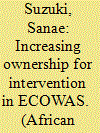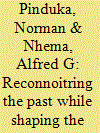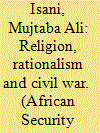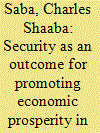|
|
|
Sort Order |
|
|
|
Items / Page
|
|
|
|
|
|
|
| Srl | Item |
| 1 |
ID:
177033


|
|
|
|
|
| Summary/Abstract |
Energy plays critical direct and indirect roles in the livelihoods of human beings. Despite its relevance, the literature highlights that a majority of rural households are energy insecure and very much rely on unclean energy sources that compromise their health. Against this background, this paper estimates the determinants of energy security at the household level based on evidence from Melani-inland and Hamburg-coastal communities in the rural Eastern Cape Province of South Africa. The study used the multidimensional energy poverty index (MEPI) to calculate the energy security status of households in the two communities while the Tobit regression model was used to investigate the main factors affecting household energy security. The results indicated that in both communities, households were energy secure. However, access to additional energy measures was low, which could affect their energy security if the primary source (ESKOM electricity) is interrupted. Tobit regression results revealed that factors like marital status, household size, electricity affordability and source of income are the most critical factors influencing the energy security status of households in the study areas. Therefore, the paper recommends policy options that improve access of rural households to additional measures on energy and affordability of electricity.
|
|
|
|
|
|
|
|
|
|
|
|
|
|
|
|
| 2 |
ID:
177037


|
|
|
|
|
| Summary/Abstract |
After the Cold War, not only the United Nations (UN) but also regional organisations began to engage in the internal conflicts of their member states. The Economic Community of West African States (ECOWAS) has long intervened in West African conflicts, and institutionalised its approach to interventions in 1999. Since then, member states have maintained and even increased their commitment to managing conflicts in West Africa regionally – a willingness that implies their ownership of interventions. This article argues that ECOWAS member states share ownership because they have developed a common understanding about intervention. The development of this common understanding is analysed with a focus on the origin and evolution of ECOWAS, that is, on the multi-level process of generating consensus and on the principle and practice of sharing the costs of resource mobilisation. I will show that, in practice, these processes led each state to perceive an enhanced sense of ownership in ECOWAS interventions. Case studies of ECOWAS interventions in Liberia, Sierra Leone, Guinea-Bissau and Cote d’Ivoire in the 1990s and the 2000s, the period when the organisation’s interventions became institutionalised, support the argument.
|
|
|
|
|
|
|
|
|
|
|
|
|
|
|
|
| 3 |
ID:
177035


|
|
|
|
|
| Summary/Abstract |
The conflict that has embroiled the Democratic Republic of Congo (DRC) for decades has been one of the most vexing problems in the political history of Africa and the larger international community. The grave clashes predominantly in the eastern parts of the country have occasioned various challenges for the state and the world at large, chief among them a record of the internally displaced persons in the state. The forces that have led to internal displacement vary but this paper takes the view that it is a result of the identity crisis, a colonial sarcoma triggered by the arbitrary drawing of borders in the African continent, and in the context of the DRC, forcing 250 different ethnic groups to be embedded in a new state. The paper divulges that the identity crisis is one of the key attributing factors to the unending skirmishes in the DRC, which has led to the escalation of the forcibly displaced people. Without giving attention to such a convoluted historical problem through the establishment of a system based on equality at the national level, the DRC will continuously be infused with unending conflicts which will further precipitate numbers of the forcibly displaced in the country.
|
|
|
|
|
|
|
|
|
|
|
|
|
|
|
|
| 4 |
ID:
177034


|
|
|
|
|
| Summary/Abstract |
This article reflects on community-based participation to reduce violent crimes in South Africa. Despite many policing strategies being developed and implemented over the years to reduce violent crimes in South Africa, these crimes are still on the increase. Against this background, the researcher reflects on some of the perceptions of violent crimes and policing that erode public confidence daily. The study is essentially qualitative in its approach. The researcher used the snowball sampling technique to identify community members from the Tshwane metropolitan area in Gauteng for in-depth interviews. The findings revealed that community members were unhappy with the level of community participation in the day-to-day policing of violent crimes in communities. This alienated them from the police and had an adverse effect on the ability of the police to enforce safety and security in communities. In view of these findings, there is a need for the police to enhance community participation so that the needs and expectations of communities are given priority.
|
|
|
|
|
|
|
|
|
|
|
|
|
|
|
|
| 5 |
ID:
177036


|
|
|
|
|
| Summary/Abstract |
What role does religion play in understanding the outbreak of civil war? The purpose of this study is to offer an alternative understanding which conceptualises religion as discourse, religious identity as sacred narrative, and religious nationalism as a conflict over the power to shape interpretations of political legitimacy. A rationalist explanation for the role of religion in the outbreak of the Algerian civil war provides an empirical motivation for the argument. By conceptualising religion largely in rational-material terms, I contend that rationalists fail to appreciate religion’s unique attraction – the belief that the ultimate seat of political authority exists beyond the state and in some transcendent reality. As an alternative, I conceptualise religion as a discursive institution, explaining how the contest to shape a faith’s sacred narrative can result in physical violence. This exercise is a first step in a broader research agenda addressing how a robust theory of religious identity can enhance scholars’ understanding of peace and conflict.
|
|
|
|
|
|
|
|
|
|
|
|
|
|
|
|
| 6 |
ID:
177038


|
|
|
|
|
| Summary/Abstract |
This study investigates the impact of security outcomes on economic prosperity in Africa and its Regional Economic Communities (RECs) using a balanced panel data of 35 African countries and eight RECs for the period 1990–2015. Economic prosperity was measured with real GDP per capita as the proxy while security outcomes was computed from security effectiveness and legitimacy by using principal component analysis. This study employs a panel causality test and the Generalised Method of Moments (GMM) estimation techniques. The empirical results suggest that security outcomes promotes economic prosperity at the continental level and in six RECs. This implies that the security measures used in this study are important in providing an enabling environment for economic activities and opportunities despite the numerous security challenges facing the continent. Thus, an appropriate policy to improve and strengthen the security sector should be given priority in the RECS and across the entire continent.
|
|
|
|
|
|
|
|
|
|
|
|
|
|
|
|
|
|
|
|
|